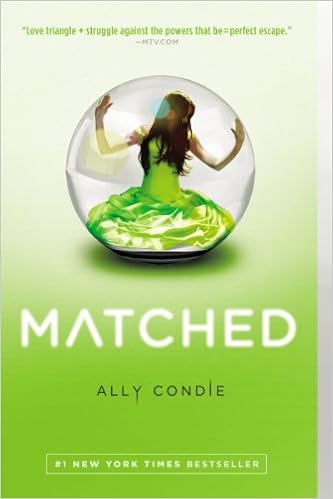It's strange how immediately after finishing a book I can have a dim view of it, but find that it sticks around in my headspace days or even weeks later. When that happens, I always try to figure out why. Was my initial impression wrong? or perhaps I missed some redeeming facet? or maybe I was suffering from reader burn-out? It's a tough position to be in because I like to think of myself as a strong reader with a certain level of discernment.
Matched, which I read in January, is proving a bit of a brain fungus. I can't quite get it out of my headspace and my thoughts keep circling back to it. About two thirds of the way in the read, I started getting really impatient with it and irritable with the characters. I have a student, Irene, who was familiar with the book but she eventually decided she couldn't get through it and dropped it. After pushing through to the end, I wondered if Irene hadn't the right idea.
This is yet another dystopian utopia YA book; they've been in vogue recently. Also, it's the beginning book of yet another series. I don't understand the recent trend with impossible love triangles. Maybe this was always a thing. I don't know, but recently it's seems to be cropping up everywhere in YA lit. Edward and Jacob in the Twilight series is an excellent example of this. Perhaps this is linked to my earlier observation that series lit and trilogy lit seems more prevalent. It is definitely a way of throwing obstacles at a potential couple. Anyway, by the end of the second chapter, Matched was clearly heading in same direction. It's possible that this colored all the rest of my read because, in hindsight, there are several interesting ideas.
One of which is that the "perfect" society streamlined art and culture into the 100 bests: 100 best paintings, 100 best novels, 100 best poems, etc. No new art is produced and everything else is destroyed. The main character is given two poems by her grandfather that are not on the list of approved poems. One of the two is Dylan Thomas's "Do Not Go Gentle Into That Good Night." This happens to be one of my favorite poems and I think accounts for why the book keeps bobbing up out of my subconscious. Looking back at it, there is an interesting statement about the effect of good art and the power of it.
I'm not sure this is the most fabulous book ever, but I think it deserves better than my initial opinion. I had not planned to spend the time reading the next two books in the series. I might have to change my mind.

I love your blog Lydia. You are by far my favorite teacher!
ReplyDeleteaww shucks
Delete